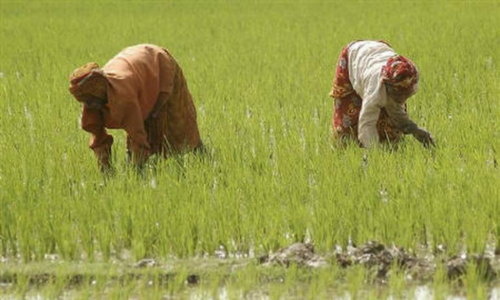LAHORE: With rains dropping much below the average in the last seven weeks, irrigation demands rising and temperatures dipping in the catchment areas, the Indus River System Authority (Irsa) fears that both dams may not be filled this year, leaving Rabi crops facing huge risks.
According to the Meteorological Department data, it rained 58 per cent less than the average in the first three weeks of August. If the average of the last seven weeks (July 1 to Aug 23) is taken as a benchmark, the country suffered 22pc rain deficit.
During these seven weeks, Sindh suffered the most, with 65pc less rains, Gilgit-Baltistan 34pc, Azad Jammu and Kashmir 28pc and Punjab 25pc. This water shortage naturally shifted stress on the reservoirs, which are now facing the risk of staying unfilled.
“If Tarbela Dam goes unfilled, which is now a clear probability, it will be happening for the third time in the dam’s 44-year history,” concedes Irsa spokesman Khalid Idrees Rana.
The authority is facing a dire situation: it resigned itself to the fact that Mangla would go unfilled this season, but the Tarbela Lake faces the same danger – spelling a disastrous scenario.
“The water stress is already reflected in the national distribution: Irsa has already fallen back on the Actual Average System used from 1977-82, termed 14-B in the Water Accord. It is faced with a double jeopardy: exceptional drop in rains has increased demand and drop in temperatures in catchment areas squeezed sullies. On an average, Pakistan gets 83 million acre feet water between April 1 and Aug 20. This year, it got only 72MAF.”
Along with this shortfall of 11MAF came scarcity of rain, he explains, fearing for the Rabi season: “Against the total storage capacity of 13.50MAF, the reservoirs now hold only 9.9MAF and depletion has already started. Tarbela Lake touched the 1,545 feet level a few days ago, and it stands at 1,543 feet today. Mangla Lake is 38 feet below what it was last year on the same day, and keep in mind that it’s the top 38 feet where the major portion is held.”
Punjab thinks that it is still not in any stress as far as crops are concerned, largely due to the rain pattern. “It rained healthy in upper parts of the province where rice is planted – by and large, fulfilling its needs. It rained very less, which also increased average losses, in the south where cotton dominates, where more showers could have only turned the weather humid — conducive to pest attack — and damaged crop. Hence, so far, so good,” says an official of the agriculture department.
“The increasing water stress has already sown provincial discontent, with Sindh demanding distribution under Para-2, which means further depletion of dams by anything between three and four million acre feet,” explains an official of the Punjab irrigation department.
In practical terms, it means the reservoirs will be brought down from the current 9.9MAF to anywhere between five and six million acre feet, grossly compromising the next Rabi – read food security, as wheat dominates the season. Now the choice before the provincial irrigation officials is stark, and terrible: “Whether to save five months’ investment and labour on Kharif crops or preserve some water for Rabi. It is a tightrope walk, which all of us have to walk now. Unless there are some good rains in September, the country is in for trouble.”
Published in Dawn, August 24th, 2021












































